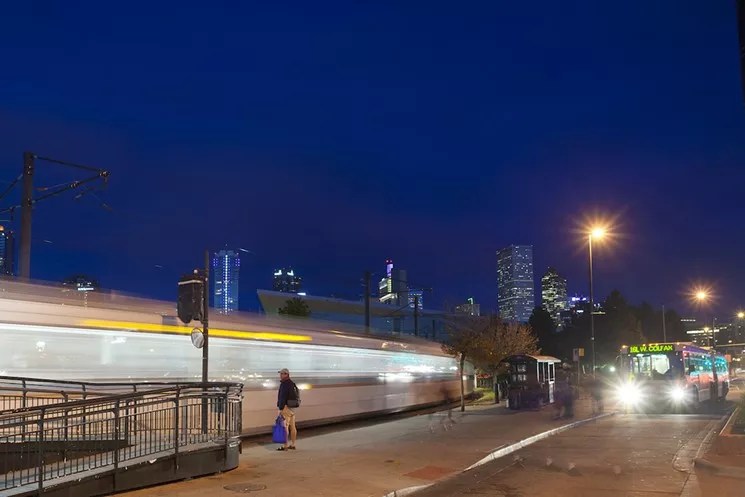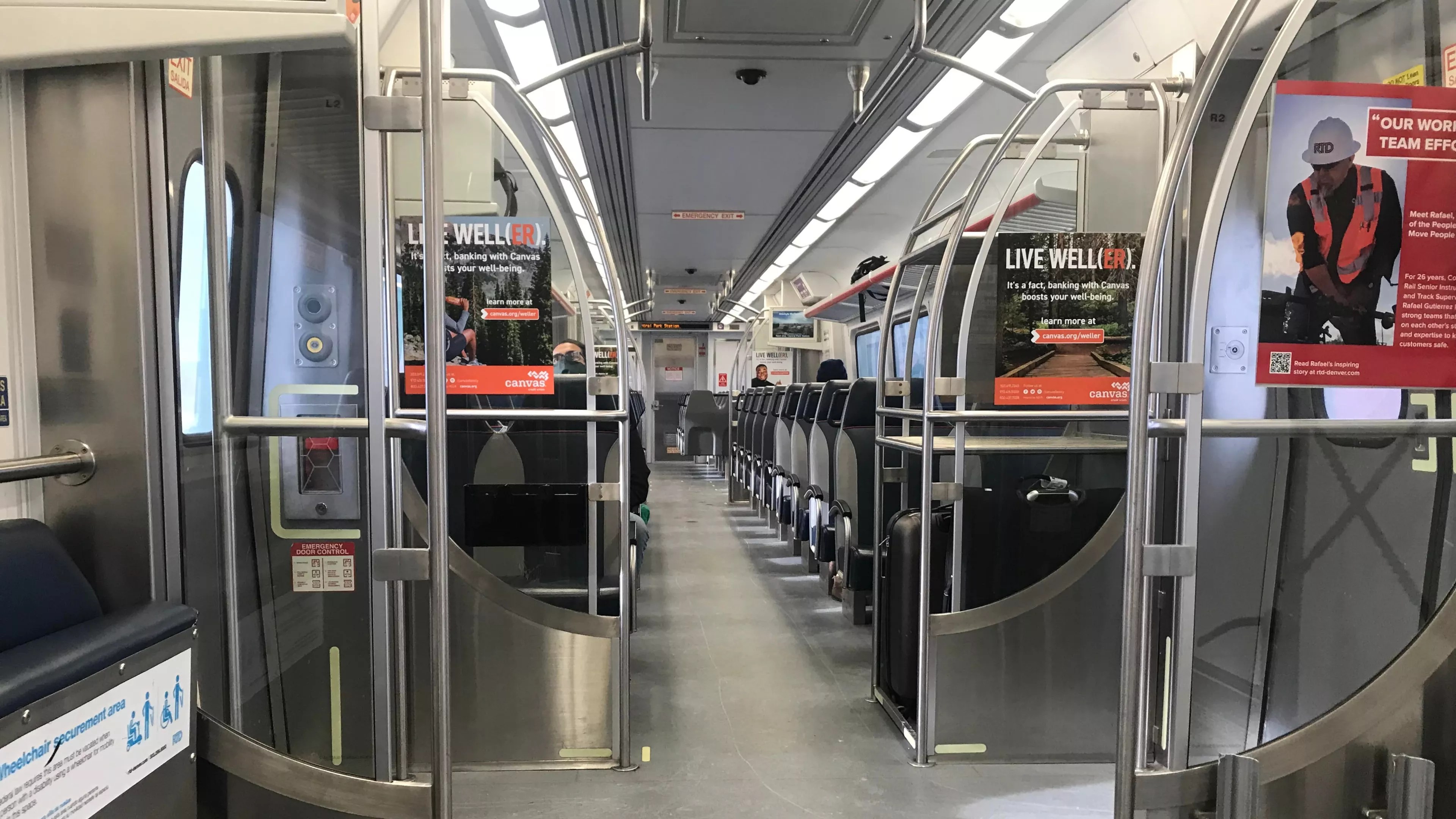
RTD

Audio By Carbonatix
Many Coloradans will have two RTD-related bubbles to fill on their November 2024 election ballots.
Voters in the Regional Transportation District’s service area will vote on whether to permanently exempt RTD from the Taxpayer’s Bill of Rights (TABOR). That area includes Denver, Boulder, Broomfield and Jefferson counties, parts of Adams, Arapahoe and Douglas counties, and a small portion of Weld County.
Additionally, anyone living in RTD Districts A, D, E, F, G, H, I or M can vote on a new RTD Board of Directors representative.
Both decisions will impact the RTD budget, as much of the annual funding for the transit agency comes from a 1 percent sales and use tax that would be subject to TABOR limits if the measure doesn’t pass; the board is in charge of approving RTD’s budget.
RTD has reached a possible turning point in its history. An outcry over poor rail service this past summer, combined with the agency’s ridership still failing to reach pre-pandemic numbers, have put the agency in hot water with some of the public.
Still, as RTD points out, ridership has grown annually since hitting a low in 2021, and the maintenance work the district is completing on its rail lines is needed not just for safety now, but the future of rail in metro Denver.
RTD’s budget is projected to surpass $1 billion for the first time by the end of 2024; RTD estimates around $600 million of those dollars would be subject to TABOR in 2025 if Ballot Issue 7A doesn’t succeed.
Ballot Issue 7A: Exempting RTD from TABOR
Ballot Issue 7A would permanently exempt RTD from TABOR, which requires any unexpected tax revenue in a year be refunded to taxpayers. RTD has been exempt from TABOR since 1995, when voters originally agreed to release the agency from TABOR restrictions through 2005. In 1999, voters extended that time frame until RTD paid bond debt from the construction of certain light rail lines, and those lines will be paid in full by November.
In 2004, voters increased RTD’s sales and use tax from 0.6 percent to 1 percent to fund the FasTracks program, in order to add additional rail transit to the RTD system, among other goals. The FasTrack vote exempted the added 0.4 percent of RTD’s sales tax from TABOR until 2050, when the FasTracks bond debt will be repaid.

One of RTD’s issues is rebuilding ridership after pandemic lows.
Photo by Michael Roberts
But the remaining 0.6 percent of RTD’s total 1 percent tax will cease to be exempt from TABOR after this year, which is why the measure is up for a vote now. A yes vote on 7A would eliminate the need for an extension on the remaining 0.4 percent of RTD tax’s TABOR exemption in 2050, as 7A would make the TABOR exemption permanent.
There is no registered opposition committee, though there are plenty of detractors – among them, supporters of TABOR and others who are unhappy with RTD generally.
But advocates say RTD’s issues will only get worse if funding is cut, and supporters created the Keep Colorado Moving campaign.
“If voters don’t take action, there will be a significant cut to funding after next year,” Danny Katz, executive director of the Colorado Public Interest Research Group, which helped form Keep Colorado Moving, said during a September 6 launch event. “That’s the exact opposite direction that we should be going. … Investing in maintenance, expanding the buses and the train routes, providing more frequency, doing innovative programs like letting young people ride for free – all of those things are dependent on RTD’s core funding.”
Keep Colorado Moving wants voters to know that the measure does not raise taxes in any way; it would just guarantee that RTD can continue to keep all the taxes it collects rather than refunding some, as the agency has done for almost thirty years.
A host of elected officials have endorsed the ballot question, including Denver Mayor Mike Johnston, many state representatives and senators who represent the Denver area, and Denver City Council members Chris Hinds, Flor Alvidrez, Paul Kashmann and Sarah Parady. The current RTD board also supports the measure.
Information About the Eight RTD Board Seats Up for Election
That board will have seven new members after the 2024 election. Eight of the fifteen RTD board seats are up for election this year, with five competitive races. One incumbent – Julien Bouquet, who represents District G – is running unopposed. Patrick O’Keefe is the only candidate for District H and Karen Benker is the only candidate for District I.
The board’s main job is to hire a general manager for RTD; board members also vote to approve RTD’s budget and gather community feedback. Current RTD general manager Debra Johnson’s contract expires next year, so the new board will be in charge of extending Johnson or hiring someone new.
You can find your RTD district on this map, or check your ballot to see if you’ll be voting on a board candidate.
District A, which covers central Denver, is the only race for which there are three candidates: Kiel Brunner, Bob Dinegar and Chris Nicholson. Brunner is a data scientist who says he is running for the RTD board to put climate at the center of the agency’s work; he has secured several big endorsements, including from Governor Jared Polis. Dinegar is a former RTD operator who says he wants to make transit more competitive with car trip times. Nicholson is a regular RTD rider and is also endorsed by many high-profile people and organizations, including Denver Mayor Mike Johnston.
In District D, which covers south Denver, Englewood and Littleton, Chris Gutschenritter and Barbara McManus are the candidates. Gutschenritter is an IT professional and career consultant, and did a recent project with Amtrak. McManus worked at RTD in various roles for over a decade.
District E covers southeast Denver, part of Aurora and Centennial. Candidates in District A are Matthew Larsen and Scott Liva. Larsen is a business professional who has lived in Denver for seven years. Liva’s main position is simplifying RTD’s fare structure, which the agency just redid earlier this year.
The eastern part of Aurora is covered by RTD District F, where Bernard Celestin and Kathleen Chandler are running. Celestin is a former RTD operator and retired Army veteran. Chandler says she wants to make RTD’s budget smaller.
RTD District M represents Lakewood, Golden and Edgewater. Brett Paglieri and Dick Shuster are running in that districtm but Paglieri’s name is the only name that will appear on the ballot as Shuster is campaigning as a write-in candidate. Paglieri is a regular transit rider and says safety and rider experience are priorities, while Shuster is a former RTD operator who had been considered for the RTD general manager position in the past.
Seven candidates have signed a pledge to fix RTD through a common-sense plan that centers on riders. Nicholson spearheaded the plan and the effort to get other candidates to sign on. Gutschenritter in District D, Larsen in District E, Celestin in District F, O’Keefe in District H, Benker in District I and Paglieri in District M have all signed the pleage.
The pledge involves three sections: quality end-to-end, safety you can feel, and a schedule RTD can deliver. Ideas like adding QR code access to real-time departure information, bus route availability, popular destinations and safety tools are part of the quality end-to-end mission.
As for safety, the pledge calls for the board to make sure RTD’s executive leaders ride RTD regularly and hire safety ambassadors for stations and known problem routes. For scheduling, the pledge promises to discuss system reliability data at every board meeting, offer real-time GPS data about where trains and buses are, and be more transparent when things aren’t working.
Every candidate’s website is linked in this story (except for Bouquet, who does not have one); check those links to learn more. Greater Denver Transit, an advocacy group in Denver, also sent out detailed questionnaires to the candidates, most of whom replied.